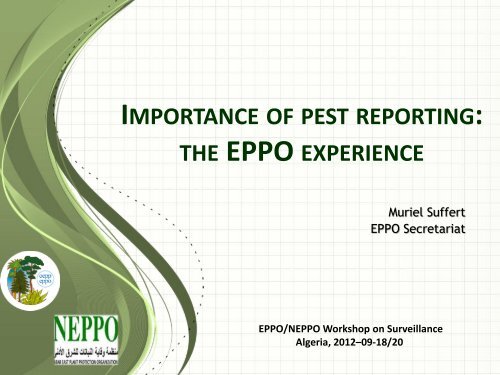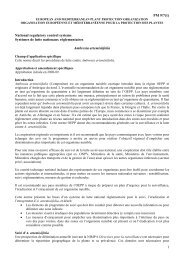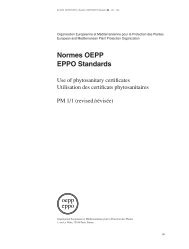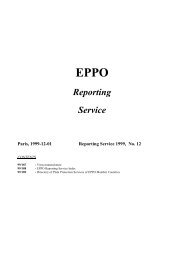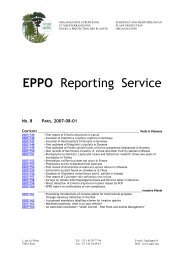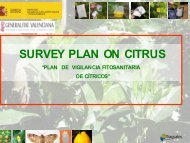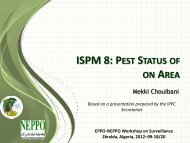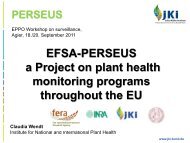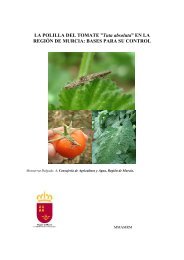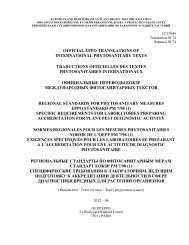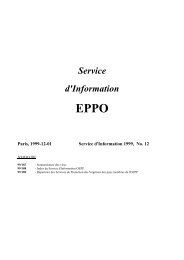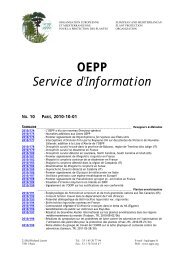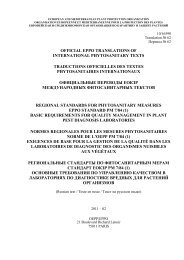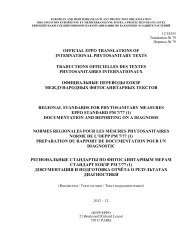importance of pest reporting the eppo experience - Lists of EPPO ...
importance of pest reporting the eppo experience - Lists of EPPO ...
importance of pest reporting the eppo experience - Lists of EPPO ...
You also want an ePaper? Increase the reach of your titles
YUMPU automatically turns print PDFs into web optimized ePapers that Google loves.
IMPORTANCE OF PEST REPORTING:<br />
THE <strong>EPPO</strong> EXPERIENCE<br />
Muriel Suffert<br />
<strong>EPPO</strong> Secretariat<br />
<strong>EPPO</strong>/N<strong>EPPO</strong> Workshop on Surveillance<br />
Algeria, 2012–09-18/20
REPORTING OBLIGATIONS<br />
TO <strong>EPPO</strong>
Reporting obligations<br />
<strong>EPPO</strong> Convention<br />
Article VI. - Obligations <strong>of</strong> Member Governments<br />
a. Member Governments shall furnish to <strong>the</strong><br />
Organization so far as is practicable such<br />
information as <strong>the</strong> Organization may<br />
reasonably require in order to carry out its<br />
functions, including in particular <strong>the</strong><br />
information referred to in Article V f1 and V<br />
f2.
Reporting obligations<br />
<strong>EPPO</strong> Convention<br />
Article V. – Functions<br />
The functions <strong>of</strong> <strong>the</strong> Organization shall be:<br />
f. to disseminate information by<br />
– 1. obtaining information from Member Governments on<br />
<strong>the</strong> existence, outbreak or spread <strong>of</strong> <strong>pest</strong>s, and<br />
conveying such information to Member Governments;<br />
– 2. providing for <strong>the</strong> exchange <strong>of</strong> information on national<br />
phytosanitary legislation, lists <strong>of</strong> regulated <strong>pest</strong>s, or<br />
o<strong>the</strong>r measures affecting <strong>the</strong> free movement <strong>of</strong> plants<br />
and plant products;<br />
– 3. establishing a documentation and information service<br />
and publishing in an appropriate form material for<br />
technical or scientific advancement;
Reporting obligations<br />
IPPC Article IX on RPPOs<br />
2. The regional plant protection organizations<br />
shall function as <strong>the</strong> coordinating bodies in<br />
<strong>the</strong> areas covered, shall participate in<br />
various activities to achieve <strong>the</strong> objectives <strong>of</strong><br />
this Convention and, where appropriate,<br />
shall ga<strong>the</strong>r and disseminate information.
HOW <strong>EPPO</strong> DEALS WITH<br />
PEST REPORTS?
Why collect <strong>pest</strong> reports?<br />
• To inform all <strong>EPPO</strong> member countries about<br />
new introductions, new outbreaks, eradication<br />
• To initiate <strong>EPPO</strong> activities on Pest Risk<br />
Analysis, <strong>pest</strong> listing, preparation <strong>of</strong> <strong>pest</strong>specific<br />
standards
What is reported to <strong>EPPO</strong> by NPPOs?<br />
• New introductions and outbreaks <strong>of</strong> regulated <strong>pest</strong>s<br />
• Eradication <strong>of</strong> regulated <strong>pest</strong>s<br />
• Updates about <strong>the</strong> situation <strong>of</strong> regulated <strong>pest</strong>s<br />
• Emergence <strong>of</strong> new phytosanitary problems<br />
• Notifications <strong>of</strong> non-compliance (interceptions) – via<br />
EUROPHYT for EU member states and Switzerland<br />
• Phytosanitary regulations and lists <strong>of</strong> quarantine<br />
<strong>pest</strong>s
Reporting <strong>pest</strong> status<br />
<strong>EPPO</strong> encourages its member countries to report<br />
<strong>of</strong>ficial <strong>pest</strong> status using <strong>the</strong> terms <strong>of</strong> ISPM 8<br />
In <strong>the</strong> <strong>EPPO</strong> Reporting Service and in PQR, <strong>the</strong>re is a<br />
distinction between:<br />
<strong>pest</strong> situation (interpretation by <strong>the</strong> <strong>EPPO</strong><br />
Secretariat)<br />
<strong>pest</strong> status (<strong>of</strong>ficial declaration made by <strong>the</strong><br />
country)
Pest <strong>reporting</strong><br />
How to deal with diverse sources and formats?<br />
Information is summarized, harmonized, put back into its<br />
general context (checking what was <strong>the</strong> situation before) by<br />
<strong>the</strong> <strong>EPPO</strong> Secretariat when it is published in <strong>the</strong> <strong>EPPO</strong><br />
Reporting service or entered into PQR
<strong>EPPO</strong> Standard: Format for <strong>pest</strong> reports<br />
Harmonized format for<br />
<strong>pest</strong> reports (compatible<br />
with <strong>the</strong> FAO format)<br />
adopted in September<br />
2011.<br />
<strong>EPPO</strong> member countries<br />
have started using this<br />
format to send <strong>EPPO</strong><br />
<strong>of</strong>ficial <strong>pest</strong> reports.
<strong>EPPO</strong> Format for <strong>pest</strong> reports<br />
Future plans<br />
<strong>EPPO</strong> Standard PM 1/5: first step towards harmonization <strong>of</strong><br />
<strong>pest</strong> report contents<br />
Discussions should continue with IPPC to improve information<br />
exchange and facilitate <strong>the</strong> task <strong>of</strong> NPPOs on <strong>pest</strong> <strong>reporting</strong><br />
• Develop a web-based interface to allow member<br />
countries to send <strong>the</strong>ir <strong>pest</strong> reports electronically to <strong>the</strong><br />
<strong>EPPO</strong> Secretariat<br />
• Explore <strong>the</strong> IT solutions that would allow rapid and easy<br />
exchange <strong>of</strong> information with o<strong>the</strong>r bodies collecting<br />
<strong>pest</strong> reports (IPPC and EU) - e.g. xml format?
COLLECTION OF OTHER<br />
DATA
Collection <strong>of</strong> non-<strong>of</strong>ficial data<br />
• Peer-reviewed international<br />
journals<br />
• CAB Plant Protection Database<br />
• National journals<br />
e.g. Annali della facolta di agraria,<br />
Acta Entomologica Sinica,<br />
Entomologia Croatica, Gesunde<br />
Pflanzen, Novényvédelem, Ochrona<br />
Roslin, Phytoma, Zashchita Rastenii...<br />
Over 100 publications reviewed!<br />
• Conference proceedings<br />
• Books<br />
• Internet ressources
Data collection via <strong>EPPO</strong> network<br />
• Experts from Panels<br />
-Panels specialized on <strong>pest</strong>s (diagnostics)<br />
-Panels dedicated to forestry, potato<br />
• Network <strong>of</strong> scientists
DISSEMINATION OF<br />
INFORMATION<br />
http://www.<strong>eppo</strong>.int/
<strong>EPPO</strong> convention (18th <strong>of</strong> April 1951)<br />
Article V. – Functions<br />
The functions <strong>of</strong> <strong>the</strong> Organization shall be:<br />
f. to disseminate information by:<br />
1. obtaining information from Member Governments on <strong>the</strong><br />
existence, outbreak or spread <strong>of</strong> <strong>pest</strong>s, and conveying such<br />
information to Member Governments;<br />
2. providing for <strong>the</strong> exchange <strong>of</strong> information on national<br />
phytosanitary legislation, lists <strong>of</strong> regulated <strong>pest</strong>s, or o<strong>the</strong>r<br />
measures affecting <strong>the</strong> free movement <strong>of</strong> plants and plant<br />
products;<br />
3. establishing a documentation and information service and<br />
publishing in an appropriate form material for technical or<br />
scientific advancement;
Information flow within <strong>EPPO</strong><br />
Official <strong>pest</strong> reports<br />
from NPPOs Literature,<br />
Internet surveys<br />
Stored data
Early warning: <strong>the</strong> <strong>EPPO</strong> Alert List<br />
• Initiated in 1999<br />
• Provides early<br />
warning<br />
• Suggests possible<br />
candidates for Pest<br />
Risk Analysis<br />
It provides<br />
information on:<br />
• distribution,<br />
• host plants,<br />
• biology,<br />
• damage,<br />
• transmission,<br />
• pathway,<br />
• possible risks<br />
Critically reviewed every year (when alert has been given and no<br />
fur<strong>the</strong>r action taken, <strong>pest</strong>s are deleted after 3 years on <strong>the</strong> list)<br />
Freely available on <strong>the</strong> <strong>EPPO</strong> website: www.<strong>eppo</strong>.int
<strong>EPPO</strong> Reporting Service<br />
More than 60 years <strong>of</strong> existence…<br />
One <strong>of</strong> <strong>the</strong> first<br />
issues <strong>of</strong> <strong>the</strong><br />
<strong>EPPO</strong> Reporting<br />
Service (1955)
<strong>EPPO</strong> Reporting Service: a free monthly newsletter<br />
It contains:<br />
New data on biology, host plants, diagnostic<br />
methods and geographical distribution <strong>of</strong><br />
quarantine <strong>pest</strong>s and <strong>pest</strong>s <strong>of</strong> potential<br />
quarantine significance<br />
Interception reports<br />
Additions to <strong>the</strong> <strong>EPPO</strong> Alert List, etc.<br />
2500<br />
2000<br />
1500<br />
1000<br />
500<br />
0<br />
2007 2008 2009 2010 2011<br />
RS EN<br />
RS FR<br />
Available by e-mail
<strong>EPPO</strong> Reporting Service: example <strong>of</strong> a first record
<strong>EPPO</strong> Reporting Service: interceptions
PQR Database new version<br />
Plant Quarantine data Retrieval system<br />
A database which contains information on many plant <strong>pest</strong>s (<strong>EPPO</strong> A1/A2<br />
listed <strong>pest</strong>s, EU regulated <strong>pest</strong>s, and some <strong>pest</strong>s that regulated in o<strong>the</strong>r<br />
parts <strong>of</strong> <strong>the</strong> world), as well as on invasive alien plants<br />
- Basic data (names, taxonomic position, <strong>EPPO</strong> codes)<br />
- Host plants<br />
- Geographical distribution<br />
- Plant commodities liable to carry quarantine <strong>pest</strong>s<br />
- Categorization<br />
http://www.<strong>eppo</strong>.int/DATABASES/pqr/pqr.htm<br />
http://newpqr.<strong>eppo</strong>.org/download.php
New features
Distribution maps
Pictures
Host plants / pathways
Categorization
Collection <strong>of</strong> phytosanitary regulations
Future plans: <strong>EPPO</strong> Global Database<br />
Pest-specific documents<br />
Data sheets<br />
Pictures<br />
Reporting Service<br />
Pest Risk Analysis<br />
Diagnostic expertise<br />
Laboratories & Experts<br />
PQR data<br />
Host plants<br />
Distribution lists & maps<br />
Categorization<br />
<strong>EPPO</strong><br />
Codes<br />
Pest-specific Standards<br />
National Regulatory control systems<br />
Diagnostic protocols<br />
Phytosanitary treatments<br />
EPPT data<br />
Plant & <strong>pest</strong> names<br />
Elements <strong>of</strong> taxonomy<br />
<strong>EPPO</strong> codes
Use <strong>of</strong> information to improve surveillance<br />
• Adapt import inspection based on noncompliance<br />
reports<br />
• Adapt surveillance plans if <strong>pest</strong> oubreaks<br />
are reported (e.g. in neighbouring<br />
countries)<br />
• Initiate surveys in link with emerging <strong>pest</strong>s
Conclusion<br />
• Pest reports are an important source <strong>of</strong><br />
reliable information<br />
• <strong>EPPO</strong> collect and process information to<br />
make it more readily available to users<br />
• Sharing results <strong>of</strong> surveillance programmes is<br />
crucial to protect plants at global scale
Thank you for your attention


